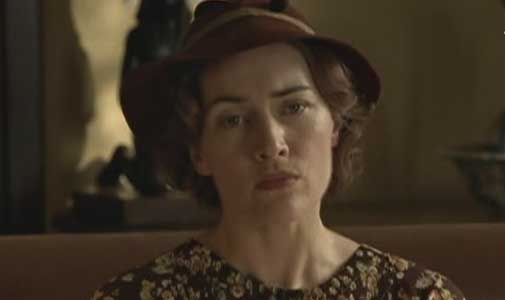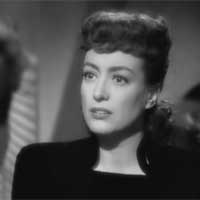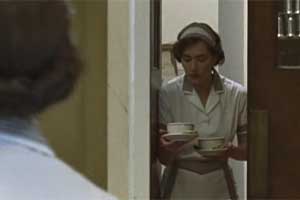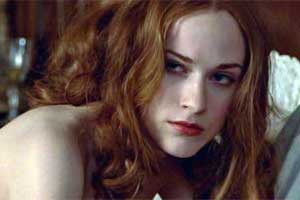
[Sorry I've been slow to provide new columns this week, but life and scholastic deadlines intervened. Back on track, though, with a review of an upcoming HBO drama I've very happy to steer you towards... - DB]
For many decades now, every time I start previewing a new TV miniseries, it's with a dual sense of anticipation and dread. Anticipation, because when done well, this is one of my favorite TV genres. Dread, because when you know from the first minute that it's probably a clunker, a multi-hour miniseries is a chunk of your life you'll never get back.
HBO's Mildred Pierce, which premieres Sunday night at 9 ET with its first two of five hours, lets you know from the very first minute that it's something special. And it is...

Kate Winslet stars, inheriting the Oscar-winning title role played by Joan Crawford in the 1945 film. Both that movie and this miniseries are based on the 1941 Depression-era novel by James M. Cain, author of Double Indemnity and The Postman Always Rings Twice. But where the movie was structured as a flashback, and built around a murder mystery, this new version is truer to the source material. There's no tacked-on killing --but there doesn't have to be.
Todd Haynes is the director of this new version (and, with Jon Raymond, co-author of the screenplay adaptation). He starts HBO's Mildred Pierce with a deliberate pace and perspective that announces his intentions clearly and confidently. In the opening minute, we don't see Winslet as Mildred -- not completely. We see her hands, methodically crimping the edges of a pie crust; a wall display of family photos and blueprints and suburban development plans; cake icing being stirred and prepared.
By the time we see Mildred's face, we already know she's a talented baker, a proud and prim homemaker, and that her husband is a successful real estate developer. Almost immediately, though, when that husband comes home, the marriage crashes and burns, and Mildred is on her own, with two young daughters, no prospects for employment, and no idea how to maintain her middle-class lifestyle.
It's no wonder Haynes, Raymond and HBO saw this as the right era in which to revisit Mildred Pierce. The story of a proud but persistent woman, struggling to survive as a parade of men both entice and disappoint her, couldn't be more timely, or more modern. And with the other key spine of the story -- Mildred's love for, and conflicts with, her daughters -- Mildred Pierce is almost like a Mama Grizzly cautionary fable. You can love your cubs to death, and do anything for them, but that may not be enough -- and they may resent you regardless.

The beauty of this adaptation is, in part, its deliberate pace. At five hours -- 60 150 percent longer than the movie -- HBO's Mildred Pierce can take us along on more of Mildred's arduous struggle, and linger on more telling details.
When she finally, reluctantly, takes a job as a waitress, we get enough close-up flavor to feel like we're sharing her shift. And long before that, we've completely lost Winslet in the title role. Kate Winslet has never been on screen longer, and has never been better.

It takes four hours for the young actress playing Mildred's elder daughter, Veda, to step aside, and have the more mature Veda show up, played by Evan Rachel Wood, the vampire queen from HBO's True Blood. Another character, played by Hope Davis, shows up once in the first hour, and doesn't reappear for a very long time -- but when she does, there's a big payoff that was the better for having simmered all that time. And boy, does that go double for Mildred's relationship with Veda. Time and again, patience in watching this drama is more than amply rewarded.
The supporting roles in Mildred Pierce are set up, and carried out, with a quiet but crucial flair. Broadway vet Brian F. O'Byrne, as Mildred's first husband, is surprising yet believable in his maturing serenity. James LeGros, as an opportunistic lover, and Guy Pearce, as a confident playboy, are given screen time to develop and change as well.
The women in Mildred's life include Melissa Leo, fresh from her Oscar for The Fighter, as a no-nonsense neighbor, and Mare Winningham as an even more stoic and flinty waitress. They're excellent, too -- in fact, everyone in this miniseries is just fine, thanks.
The only flaw in HBO's Mildred Pierce come right at the climax, when a perfect confrontation scene is followed by a very imperfect, overblown one. But the miniseries rights itself immediately after that, and ends just as satisfyingly and intriguingly as it began.
[To listen to or read my Friday review of Mildred Pierce on NPR's Fresh Air with Terry Gross, click HERE after about 5 p.m. Friday.]